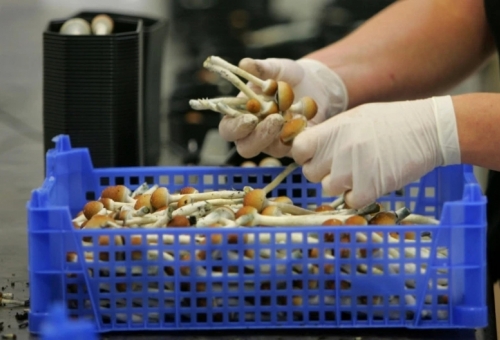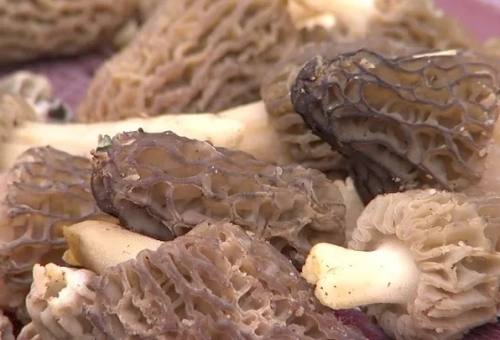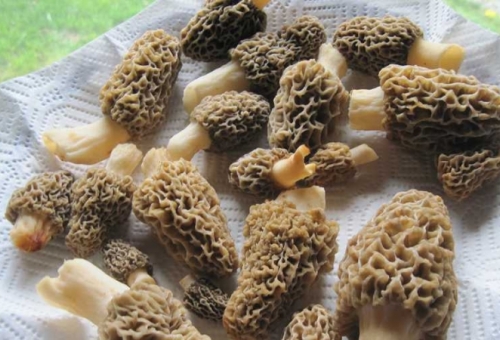Maybe all mushrooms are magic. Just weeks after scientists tell us the psychedelic ones could one day be used to treat depression, anxiety and alcohol abuse and even to stop smoking, a team of researchers in Singapore has found evidence that the fleshy, spore-bearing, fruiting bodies of fungus could ward off Mild Cognitive Impairment (MCI).
There’s ample evidence that the little toadstools are good for you, provided you avoid the poisonous ones. In addition to being fat-free, low-sodium, low-calorie and cholesterol-free, the good ones are packed with antioxidants, beta glucan fiber, B vitamins, copper and potassium. Even Mayo Clinic dedicates numerous pages on its “Healthy Recipes” section to mushrooms.
The reality is that fungi flourished on Earth for possibly more than 2 billion years, says Russell McLendon, in his article “7 Mind-Bending Facts about Magic Mushrooms.”
“They've evolved some impressive tricks during that time, including many that are either fascinating or frightening to humans — and sometimes a bit of both,” McLendon wrote. “Some ancient fungi grew nearly 30 feet tall before trees existed, for example, and today a 400-acre fungus in Oregon may be the largest organism on the planet. Certain fungi can glow in the dark, and a few turn insects into zombies. Some species are lethal to humans, while others provide us with valuable super foods…Yet even after centuries of experience, we are only now demystifying many of the magical — and medicinal — powers these mushrooms possess.”
And now a team from the departments of Psychological Medicine and Biochemistry at the NUS Yong Loo Lin School of Medicine in Singapore has found that seniors who consume more than two standard portions of mushrooms weekly may have 50% reduced odds of having MCI. Results of the six-year study were published online in the Journal of Alzheimer’s Disease this month.
Researchers said compared with participants who consumed mushrooms less than once per week, those who ate two portions per week had reduced odds of having MCI and that the "association was independent of age, gender, education, cigarette smoking, alcohol consumption, hypertension, diabetes, heart disease, stroke, physical activities and social activities. Our cross-sectional data support the potential role of mushrooms and their bio-active compounds in delaying neurodegeneration.”
Six types of mushrooms were analyzed in the study, and all were shown to be associated with reduced levels of MCI. They included golden, oyster, shiitake and white button mushrooms, as well as dried and canned mushrooms. However, according to study authors, it’s likely that other mushrooms not referenced would have also indicated beneficial effects.
The study was conducted from 2011 to 2017 on more than 600 Chinese seniors over the age of 60 living in Singapore. The study was supported by the Life Sciences Institute and the Mind Science Centre at NUS, as well as the Singapore Ministry of Health’s National Medical Research Council.
Researchers defined a portion as three quarters of a cup of cooked mushrooms with an average weight of around 150 grams. “While the portion sizes act as a guideline, it was shown that even one small portion of mushrooms a week may still be beneficial to reduce chances of MCI,” researchers noted.
“This correlation is surprising and encouraging. It seems that a commonly available single ingredient could have a dramatic effect on cognitive decline,” said lead author, Assistant Professor Feng Lei, of NUS Psychological Medicine.
According to the Alzheimer’s Association, about 15 to 20% of people age 65 and older have Mild cognitive impairment (MCI). The condition causes a “slight but noticeable and measurable decline in cognitive abilities, including memory and thinking skills.” Cognitive changes in individuals with MCI are serious enough to be noticed by them and other people but not severe enough to interfere with daily life or independent function.
While a person with MCI is at an increased risk of developing Alzheimer's or another dementia, the condition does not always progress. In some cases, MCI reverts to normal cognition or remains stable.
Older adults afflicted with MCI experience memory loss but may also show a deficit in other cognitive functions such as language, attention and visuospatial abilities. The changes can be subtle and not as disabling as the cognitive deficits of Alzheimer’s and other forms of dementia.
“People with MCI are still able to carry out their normal daily activities. So, what we had to determine in this study is whether these seniors had poorer performances on standard neuropsychological tests than other people of the same age and education background,” said Feng. “Neuropsychological tests are specifically designed tasks that can measure the various aspects of a person’s cognitive abilities. Some of the tests we used in this study were adopted from a commonly used IQ test known as the Wechsler Adult Intelligence Scale.”
Feng said the researchers conducted extensive interviews and tests with participants for the study, which took into account demographic information, medical history, psychological factors and dietary habits. Researchers measured blood pressure, weight, height, hand-grip and walking speed as well as a simple screen test on cognition, depression and anxiety.
Two-hour standard neuropsychological assessments were performed and dementia ratings given. “The overall results of these tests were discussed in depth with expert psychiatrists involved in the study to get a diagnostic consensus,” Feng said.
Researchers said they believe the reason for the reduced prevalence of MCI in mushroom eaters may come down to a specific compound found in almost all varieties. “We’re very interested in a compound called ergothioneine (ET),” said Dr. Irwin Cheah, senior research fellow at NUS Biochemistry. “ET is a unique antioxidant and anti-inflammatory which humans are unable to synthesize on their own. But it can be obtained from dietary sources, one of the main ones being mushrooms.”
A 2016 study by the team on senior Singaporeans revealed that plasma levels of ET in participants with MCI were “significantly lower than age-matched healthy individuals.” The study, which was published in the journal Biochemical and Biophysical Research Communications, led researchers to believe that a deficiency in ET might be a risk factor for neurodegeneration, and that increasing ET intake through mushroom consumption could possibly promote cognitive health.
Researchers said other compounds in mushrooms may also be advantageous for decreasing the risk of cognitive decline. “Certain hericenones, erinacines, scabronines and dictyophorines may promote the synthesis of nerve growth factors. Bioactive compounds in mushrooms may also protect the brain from neurodegeneration by inhibiting production of beta amyloid and phosphorylated tau, and acetylcholinesterase,” they wrote.
"Emerging evidence has suggested that mushrooms may have neuroprotective properties," the authors wrote. Still, even with the “promising” results, since only two epidemiological studies have looked at the cognitive benefits of eating mushroom in elderly people, it "remains unknown if mushroom consumption is associated with reduced odds of having MCI," the researchers noted.
Researchers say next they may look into performing a randomized controlled trial with the pure compound of ET and other plant-based ingredients, such as L-theanine and catechins from tea leaves, to determine the efficacy of such phytonutrients in delaying cognitive decline. Feng said the team also hopes to identify other dietary factors that could be associated with healthy brain aging and reduced risk of age-related conditions in the future.
























